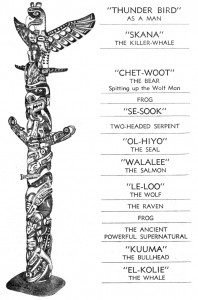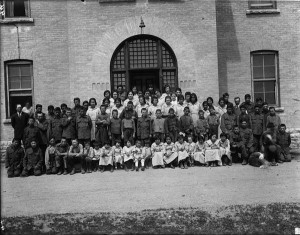1.
I think this is a fantastic question. Maybe this is because I learned the exact opposite in another course here at UBC.
I took English 348 with a well- renowned professor on campus. I have to admit he was absolutely brilliant, and I could sense his passion for the subject even before I heard his booming, theatrical voice that bounced around the room during his Shakespearean introduction. I was excited for the course and I couldn’t wait to dive into some of my favourite literature. Alas, he had me fooled.
This professor, brilliant though he was, advocated the theories of McLuhan and Ong; demonstrating the distinct existence of an oral society that existed pre-Shakespeare, and the semi-literate society that existed post-Shakespeare. He tried to argue that Shakespeare’s tragic plays, though full of love, loss, character and emotion, were instead centralized around the agonizing shift from oral culture to literate culture. What happened to reading the plays and discussing their thematic significance? What about Shakespeare’s brilliant literary devices? My professor’s perspective upset me greatly.
The arguments were fantastic. They were well-supported, somewhat logical and very interesting. However, his arguments just didn’t sit well with me. How could a culture that was so full of rich customs and traditions be degraded as a primitive culture that lived without the abstract?
I feel a similar feeling toward Aboriginal culture.
Courtney MacNeil’s article empowers oral culture. The culture is not considered simply black or white, but is instead credited for its complexity and its memory. The black-and-white parallel of oral culture vs. literate culture fails to recognize the existence of the written and the spoken that exists in both of these avenues of language. Today, while we are/were considered a literary culture (and now moving toward a digital culture) our culture would fail to exist properly without orality. This course may be something that we are each taking online, however, we all watched our professor’s introductory video. Our online course is a perfect example or how these cultures, while treated as distinct entities in my other course, are perfectly intertwined.
The abstract is everything in an Aboriginal culture. Every animal and totem pole has a story, every elder has a lesson. The falcon, the eagle, the bear, the salmon, the raven. Everything is significant, and everything is valued. This “oral culture”, while it uses orality to convey its language, does so with levels of complexity that literate culture has lost. These peoples have no means of writing anything down. They must remember what they are told. These peoples must listen when they are spoken to. The memories of these peoples are fantastic, and unheard of in any literate culture. MacNeil’s argument defending oral culture is probably one of the best articles I have read since my unsettling Shakespeare course. MacNeil states “orality is not the opposition of writing, but rather a catalyst of communication more generally, which is part of both writing and speech” as “the medium is innately connected with cultural knowledge”.
Similar to the “primitive” parallel that McNeil criticizes, Chamberlin discusses “Us and Them”. What interests me in particular is that the “barbaric” is criticized for being “them”; that which is not a part of “us”. Chamberlin makes a brilliant statement when he says “..surely different languages [orality] should be nourished the way rare species are, by protecting their habitat…Why should a particular language be preserved when another larger or stronger one seems ready to replace it?” (15-16). For the purpose of this argument, why should literacy be preserved as the dominant language when orality is still perfectly complex and dominant in Aboriginal culture? Does reinforcing and defending literate culture continue to proliferate colonialism?
Was my professor a secret supporter of the colonial effort? Just Kidding. (maybe)..
This is a residential school. This is what is agonizing. Not Shakespeare’s “transition” from “oral culture” to “literate culture”. This is brutal colonialism, and this really shouldn’t have happened.
Works Cited
“The Gutenberg Galaxy Essay – Critical Essays – ENotes.com.” Enotes.com. Enotes.com, n.d. Web. 22 May 2015.
“Ong on the Differences between Orality and Literacy | Chapter 1: Literacies on a Human Scale | Literacies | New Learning.” Ong on the Differences between Orality and Literacy | Chapter 1: Literacies on a Human Scale | Literacies | New Learning. Methuen, n.d. Web. 22 May 2015.
“Stories the Totems Tell: Bringing Aboriginal Poles to Life.” Https://www.aadnc-aandc.gc.ca. Government of Canada, 2000. Web.



Hi Hailey!
I also wrote on the topic regaring orality vs literacy and it was really interesting reading an entry from a different perspective. I agree wholeheartedly with what you covered, and agree that MacNail’s argument for orality was very moving and eye opening for me, touching on the various ways our society hierarchically structures communication that I had not noticed before. One of my favourite “experiences” to have in classes is not when I learn something new necessarily…but RElearn how to see things in a new light. I also love how you brought in a personal experience with a literature class at UBC. Its funny how, seeing from many people’s introduction blogs, a large majority of us taking this class are in some way an english major or minor. This in and of itself is a concentrated area where we constantly are studying and being taught about the IMPORTANCE of the written word, and not often enough about the ways in which it has pushed cultures that still rely heavily on orality to the side. Like you mentioned, MacNeil’s defence of orality is the exact OPPOSITE of what we learn at UBC.
To answer your question about if reinforcing and defending literate culture continues to proliferate colonialism, i would have to say yes. As I mentioned in my blog post, I think that the ideology that only syllabic and alphabetical literacy counts as legitimate is a plague for Western/European culture because it not only subjugates and harms those like the Aboriginal, but also ourselves by limiting our understanding of what true culture is.
Please feel free to take a look at my blog post on this topic and let me know what you think! Have a great weekend 🙂
Hey Freda!
I totally agree with what you’re saying. I find that so often we are caught up in our own personal experiences and opinions and we forget to see things from other perspectives! I find it funny that so many of us are studying literature and speaking about this topic as well. It’s certainly ironic that most of us study the words that we are criticizing as we speak. Well.. Maybe “criticizing” is a strong word, however we’re certainly shedding light on the significance of orality as an equal and relevant partner to literate culture!
Something interesting that I learned in this particular Shakespeare course (I guess it wasn’t completely useless) was McLuhan’s theory about the meaning of language. McLuhan makes a really interesting point about meaning and value within language. Essentially, no word or letter has value/meaning until we provide the word with value/meaning. However, these letters are consistently thrown within different words/contexts which change their particular value/meaning. McLuhan says Shakespeare cries “words, words, words” because of this endless manipulation and proliferation of language. These letters/words face endless interpretations and understandings. Nothing is real.. apparently. This reveals a removal that exists between the individual writing, the document itself, and the individual (presumably different) who is reading. While we are in person we have the advantage of interpreting body language and listening to expression. Written language, however, suffers from ambiguity. I can’t remember how many times I’ve misread a text/an email.. all due to the endless interpretive space that exists between the writer and the reader.
I hope I didn’t tangent from your comment too much!
Thanks for reading:)
Hailey
🙂
Hi Hailey,
I thought this was quite funny — I actually considered writing something similar to this because I took ENGL 348 and 419 with the prof you’re talking about. He’s incredibly charismatic and charming and speaks with so much conviction that it was hard for me to even question him. If I’m being completely honest, when he would echo Ong and say things like “oral cultures are primitive cultures,” I would mindlessly nod in agreement. It really is such a shame that this kind of teaching still exists. Statements like these make it impossible to disagree with the fact that we live in a post-colonial world, and people like myself who blindly follow the people who preach these ideas really need to be mindful of what’s being said at all times, regardless of what discipline we’re studying.
Theres is of course a danger in drawing a definitive line between oral and literary cultures. But the way that Ong describes primary orality seems actually kind of complimentary (despite the use of terms like ‘primitive’ and ‘barbaric’). He says primary oral cultures are rooted in memory, closer to the human life form, more community-based (participatory), which sounds nice to me! But I could just be speculating based on the little bit that I remember from his book “orality and literacy.” While Ong says that the introduction of literature overpowers oral culture and alters it, is he criticizing oral culture or lamenting its demise?
Also, what do you think about McLuhan’s idea of the advent of social media “re-tribalizing” our culture? The “medium is the message” now, so are we moving away from literary culture and going back to storytelling? This is, of course, a huge question, but it’s one worth pondering.
Looking forward to reading more!
Hey Melissa,
AWESOME!! I love that we’re on the same page about this. I feel similar, and I also found myself doing similar things as yourself– nodding in agreement, facilitating discussion with other classmates etc. I’ll speak in your defence and say that you definitely weren’t following him blindly! With the course that we took it was so necessary to just agree, spit out everything that we had memorized from his lectures before and pray that we received a passing mark (if my PTSD allows me to remember correctly..)
Maybe I’m too harsh, honestly. I’ve always been the type to cheer for the underdog, and in this case it was definitely orality. You’re totally right about Ong though! While his focus wasn’t necessarily about the positives of oral culture, Ong comments on the brilliant ways oral culture went about remembering everything that they said (repetition, rhyme, meter etc etc.). You’re definitely not speculating there.
To answer your question about literate culture overtaking oral culture: I think it’s maybe a bit of both. I have to admit I haven’t picked up Ong’s essay since that course ended (intentionally). However, from what I remember Ong was giving oral culture credit where credit was due, but he was also demonstrating the “new and improved” culture that our society had moved toward.
Awesome McLuhan question. I definitely think McLuhan was onto something with that statement. If you think about it, digital culture is completely entangled in both oral culture and literate culture. While we read blogs, articles, newsfeeds and messages daily, we also watch YouTube clips, post pictures and videos and consistently try to validate ourselves and profile ourselves through our social media. Without social media, and without our digital profile/personality, we are pretty much completely isolated from our surrounding world. This is despite the fact that we are living, breathing human beings in the actual world and mere digital copies on the http://WWW.. In this sense I think McLuhan was really smart to refer to our digital community as a re-tribalized culture. Our online community is a mosaic of profiles, posts, shares and likes, and if you fail to comply you really, truly are kicked out of the tribe.
Thanks for commenting, Melissa!!
Hailey
🙂
🙂